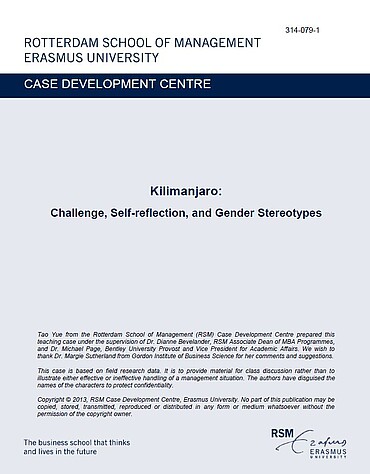description
The Kilimanjaro case describes the journey up Mount Kilimanjaro of four ambitious women, of different ages, and from diverse cultural backgrounds and life situations, who have learnt that it is possible to work well in a highly risky and demanding environment with other women. Will they reach the top?
Abstract
The case is based on the RSM MBA Kilimanjaro Women in Leadership elective. The elective is designed to bring female business leaders – often accustomed to being outnumbered by male colleagues – to learn to work with groups of high achieving women.
The case describes the journey up Mount Kilimanjaro of four ambitious women – women of different ages, and from diverse cultural backgrounds and life situations, who have learnt that it is possible to work well in a highly risky and demanding environment with other women. After initial misunderstandings, the difficult nine-day trek forces them to work together to overcome physical and mental barriers. Participants report that the preparation, climb, and post-climb reflection made them more aware of their personal capabilities, resilience, and ability to build the mutually supporting networks needed to ascend their heights in the personal life and also in the organizations they wish to build and lead. They also report that it is helping them to: (a) recognise the complexities facing high-potential women and the importance of relying on one another to reach a common goal; (b) gain a greater understanding of how people make decisions in high-risk situations; and (c) reflect on women’s potential to overcome the social, organisational and cultural ‘mountains’ that stand in their way.
For female students, the case will make them appreciate the importance of supporting one another as women and help them develop greater trust in other women while pursuing their challenging goals. For male students, the case will make them better understand their female colleagues and be more aware of gender bias in the corporate sector as well as in education. For educators, the case requires them to ponder how personal change occurs, how adults learn, and how educational institutes can and should measure the impact of personal development.
Objective
This case has four main learning objectives, namely to help audience: 1. Appreciate the challenges and complexities facing high-potential women who push themselves to achieve great professional heights. 2. Recognize the importance of working together and relying on one another when striving to reach a common goal. 3. Gain a greater understanding of how people make decisions in high-risk situations, the increased importance thinking clearly and objectively in such pressured circumstances, and the impediments to doing this that need to be overcome. 4. Reflect on the potential for women to reach their goals even in the presence of the social, organizational, and cultural “mountains” that stand in their way. 5. Reflect on how personal change occurs and how adult learn, and how educational institutes can and should measure the impact of personal development. 6. Ponder on the question of gender bias in organizations.
usage
This case can be used to gain a greater understanding of how people make decisions in high-risk situations and to recognize the importance of working together and relying on one another when striving to reach a common goal.
Citation Note
Based on Field Research; 10 pages.
Follow the 'handle' link to access the Case Study on RePub.
For EUR staff members: the Teaching Note is available on request, you can contact us at rsm.nl/cdc/contact/
For external users: follow the link to purchase the Case Study and the Teaching Note.
